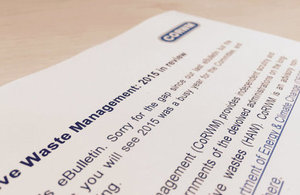CoRWM eBulletin: 2015 in review
The Committee has restarted its eBulletins. This one looks back at the Committee's work in 2015.

CoRWM eBulletin: 2015 in review
Welcome back to the Committee’s eBulletin. As you will see 2015 was a busy year for the Committee, and 2016 is expected to be just as challenging.
The Committee on Radioactive Waste Management (CoRWM) provides independent scrutiny and advice to the UK Government and the Governments of the devolved administrations on the long-term management of higher activity radioactive wastes (HAW). CoRWM is an advisory non-departmental public body, sponsored by the Department of Energy & Climate Change (DECC), and CoRWM’s 2015-16 Work Programme can be found here.
Update on work from “Implementing Geological Disposal”
The “Implementing Geological Disposal” White Paper set out plans for the development of a Geological Disposal Facility for HAW in line with the UK Government’s policy for England and Northern Ireland.
The Community Representation Working Group (CRWG) was set up to determine the definition of a community, community representation and the benefits available to a community for participating in the voluntarist process for siting a Geological Disposal Facility (GDF). More information on geological disposal, what a GDF is, and why we need one can be found here. CoRWM has observed the meetings of the group throughout the year, and is monitoring the delivery of the CRWG objectives.
Radioactive Waste Management Ltd (RWM) conducted a public consultation with supporting meetings, on the development of their National Geological Screening Guidance. The consultation ran between the 8th September and 4th December 2015, and RWM is currently in the process of analysing the responses received. Members of CoRWM attended 4 out of the 16 events as observers, to scrutinise RWM’s plans, along with its communication and engagement. CoRWM have provided both RWM and DECC with feedback on these events, to inform future public engagement opportunities that both organisations will be doing.
DECC’s 2014-15 update on the management of higher activity radioactive waste in line with the “Implementing Geological Disposal” White Paper can be found here.
Update on Wales
Carl Sargeant, Minister for Natural Resources made a statement in May 2015, to say that the Welsh government has adopted a policy of geological disposal for their higher activity radioactive waste (HAW), in line with England and Northern Ireland.
A public consultation began in May 2015 regarding community engagement and implementation processes for geological disposal. The CoRWM response to the Consultation can be found here. CoRWM supports the Welsh Government’s decision to adopt the same policy for HAW as England and Wales, and it believes that the arrangements for implementation and community engagement should be predicated on the basis that a Welsh community is as likely to volunteer as an English one.
Update on Scotland
In May 2015, the Scottish Government opened its consultation on an implementation strategy for its policy on HAW, which was formulated in 2011. The Scottish Government’s policy is that the long-term management of HAW will be on the basis of near site, near-surface facilities. There is no prescriptive definition of near site other than as near to the site where waste was produced as practicable. Scottish Government do not currently support geological disposal. All responses to the consultation can be found here, including that from CoRWM. This consultation was about implementing the 2011 policy, and a policy review is some years away in 2021. CoRWM remains concerned that the vast majority of intermediate level waste (ILW) at Dounreay, 70% by volume and 99% of the radioactivity, is not suitable for near surface disposal and therefore could only be held in interim storage with the current policy.
Spent fuel and nuclear materials
CoRWM met with the Nuclear Decommissioning Authority (NDA) in March 2015 to discuss its management of uranium, plutonium and spent fuel (including Magnox, oxide and light water reactor fuels). A record of the main points and conclusions can be found here.
Triennial Review
The second Triennial Review of CoRWM was completed in December 2015. The Review recommended that CoRWM should continue and it reinforced the value of the CoRWM’s work. The full report can be read here.
Forthcoming meetings
The next plenary meeting of CoRWM open to the public is on 17th March 2016 in London. Full details will be published on our website soon. Further plenary meetings open to the public are planned for April (London), June (Edinburgh) and September (Cardiff) and will be advertised in due course.
2016-17 Work Programme
CoRWM is currently developing its proposed Work Programme for 2016-17. The proposed programme will be finalised for submission to Ministers at the open plenary meeting in London on 17th March.
Stay up to date
If you would like to receive this eBulletin by email, please email corwm@decc.gsi.gov.uk.
You can also follow us on twitter @CoRWM, or write to the Secretariat at;
Secretariat to the Committee on Radioactive Waste Management, Department of Energy and Climate Change, 3 Whitehall Place, London, SW1A 2AW.